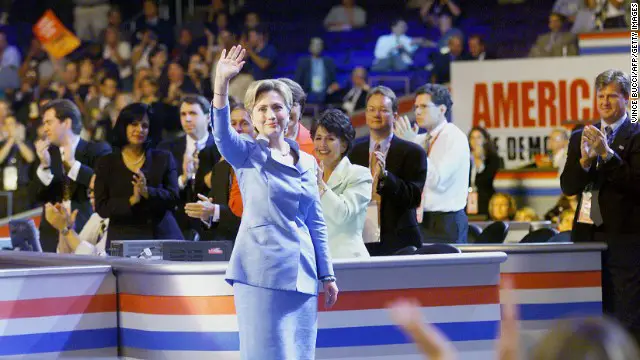We’ve talked about “superdelegates” a bit on this site. Clearly, most people don’t understand the system, so we thought we’d start a discussion. The topic comes up during every primary season and many voters express frustration over the fear that “superdelegates” can steer the Democratic nomination out of the hands of voters.
In his book, “Strategic Decision-Making in Presidential Elections,” author Kenny J. Whitby says:
The reforms of the 1970s sought to involve the Democratic Party’s rank-and-file voters in the presidential nomination process. By all accounts, the reforms achieved their objective. However, the plebisciteary vision of democracy in presidential elections, which is rooted in the Progressive Movement of the late 1800s, has eroded party control of nomination outcomes. In response, defenders of party reassertion argued that input from party professionals is essential for choosing electable candidates, for creating meaningful accountability, and for governance. Complaints from party notables about the lack of seasoned party politicians at national conventions led to calls to give them a greater voice in the selection process. Under pressure from party insiders, the DNC responded by creating a new category of delegates to the national convention, dubbed “superdelegates.”
I think the description above misses some information, so from one who was there, let me explain a little more. In 1968, there was an uprising of liberals against President Johnson (LBJ), because of the Vietnam War. So they turned to upstart Sen. Eugene McCarthy, and later, also to Sen. Robert Kennedy. LBJ could see that the party was being torn apart by the war, so he declined to run for re-election. He endorsed Vice President, who won the nomination, heavily backed by the party establishment.
Four years later, liberal Sen. George McGovern won the nomination—and lost the general election in one of the greatest landslides in history, taking just one state. The party decided that radicals are more likely to vote in a primary, so if the party was to win again, it would have to find a way to counter “the base.” The idea is that party stalwarts would be more interested in winning than pushing an unpopular agenda, so the idea of “superdelegates” was born.
And, this year, there are complaints that the superdelegates are pushing Hillary over Bernie, as in this Washington Times article:
There’s something deeply undemocratic about the Democratic Party’s heavy reliance on superdelegates in selecting its presidential nominee, as far as those backing Sen. Bernie Sanders are concerned. . .
What steams Sanders supporters is that the Democratic Party superdelegates — party insiders who receive a vote at the party convention and are not bound to back any candidate, like the elected “pledged” delegates — are lining up overwhelmingly behind former Secretary of State Hillary Clinton.
She holds a not-insurmountable lead over the Vermont senator after Super Saturday by 663 to 459 delegates, but when it comes to superdelegates, it’s not even close. Mrs. Clinton has the backing of nearly every superdelegate with 458, while Mr. Sanders has just 22, according to Associated Press estimates.
The candidates need 2,383 delegate votes to win the nomination at the Democratic National Convention in Philadelphia.
In other words, there’s a scenario in which Mrs. Clinton could lose the popular delegate vote but win the nomination by amassing enough superdelegates.
The same article notes that the GOP also has what it calls “unbound” voters, but not enough to make a real difference.
For all the criticism this year of the GOP establishment, Republicans are far more egalitarian when it comes to doling out convention votes. Each state, as well as the District of Columbia and five U.S. territories, has three GOP “unbound” voters — the Republican National Committee state chairman and chairwoman, and the state party chair — for a total of 168.
Recent changes to the RNC rules require the free-agent delegates to back the candidate nominated by their state. Democrats, meanwhile, have 712 superdelegates who can essentially vote for whomever they choose.
Currently, Hillary has more than a thousand delegates (almost half of the 2,383 needed), while Bernie has less than 500. But in elected delegates, Hillary is only ahead by about 200.
Is the game over? Not according to FiveThirtyEight:
If you’re a Sanders supporter, you might think this seems profoundly unfair. And you’d be right: It’s profoundly unfair. . .
Here’s the consolation, however. Unlike elected delegates, superdelegates are unbound to any candidate even on the first ballot. They can switch whenever they like, and some of them probably will switch to Sanders if he extends his winning streak into more diverse states and eventually appears to have more of a mandate than Clinton among Democratic voters.
Clinton knows this all too well; it’s exactly what happened to her in 2008 during her loss to Barack Obama. According to the website Democratic Convention Watch, Clinton began with a substantial advantage in superdelegates, leading Obama 154 to 50 when New Hampshire voted on Jan. 8, 2008. Obama narrowed his deficit in February and March, however, and overtook Clinton in superdelegates in mid-May. By the time Clinton ended her campaign on June 7, 2008, Obama had nearly a 2-to-1 superdelegate advantage over her.
If you want to see a nice, updated chart of elected, super, and total delegates, it’s available from Democratic Convention Watch.
OK—so although this year looks like a blowout for Hillary and The Donald, it ain’t necessarily so.
